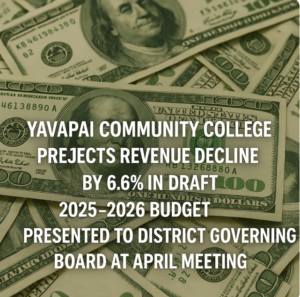
Author Archive for Robert Oliphant
PHONE THREAT TRIGGERED LOCKDOWN AT YAVAPAI COMMUNITY COLLEGE
Lockdown lifted and all clear given at 11:00 a.m. Monday, May 19
A lockdown affecting all Yavapai College campuses was lifted late Monday morning following an early morning threat made by phone. According to various news reports, at approximately 4:15 a.m., a caller claimed to be inside a Yavapai College classroom with a firearm, prompting a rapid response from multiple law enforcement agencies and the immediate lockdown of all college locations.
Authorities conducted thorough searches of each of the college’s seven sites, including those in Prescott, Prescott Valley, Chino Valley, Clarkdale, Prescott Pines, and Sedona. While students, employees, and the public were instructed to avoid the campuses, no threat was ultimately found, and the all-clear was issued around 11 a.m. Despite this, college officials decided to keep all campuses closed for the remainder of the day as a precaution.
In a statement, a Yavapai College spokesperson expressed gratitude to the community for their patience and to law enforcement for their swift and coordinated response. The college emphasized its commitment to safety and praised the continued collaboration with first responders in protecting students, staff, and the public.
Statement from Yavapai College
Around 4:15 a.m. today, all Yavapai College campuses and centers were placed on lockdown due to a threat received by phone of an individual claiming to be in a Yavapai College classroom with a firearm. Multiple Yavapai County law enforcement agencies, along with Yavapai College Campus Safety, responded and thoroughly cleared all seven college locations, which include Prescott, Clarkdale, Prescott Valley, Chino Valley, the Career and Technical Education Center, Sedona, and Prescott Pines. The threat was found to be unsubstantiated, and there were no injuries.
The investigation is still ongoing.
We appreciate your patience and understanding as our first responders worked to ensure everyone’s safety, and we thank our law enforcement agencies for their coordinated efforts and quick and efficient response.
Thank you to the law enforcement agencies for their continued collaboration in keeping our employees, students, and community members safe.
YAVAPAI COMMUNITY COLLEGE ANTICIPATES REVENUE DECLINE BY 6.6% IN DRAFT 2025–2026 BUDGET PRESENTED TO DISTRICT GOVERNING BOARD AT APRIL MEETING
Although various factors affected the reduction, the reduction was mainly due to the expected withdrawal of federal funding for several programs and the approval of only a few new capital projects, which eliminated the need to draw down money from a revenue bond to support a larger number of projects
 Yavapai Community College’s total revenue is projected to decline in the 2025–2026 draft budget. According to information presented to the District Governing Board at its April meeting, revenue is expected to fall from approximately $126.8 million in 2024–2025 to around $118.4 million in 2025–2026—a decrease of $8.4 million (6.6%).
Yavapai Community College’s total revenue is projected to decline in the 2025–2026 draft budget. According to information presented to the District Governing Board at its April meeting, revenue is expected to fall from approximately $126.8 million in 2024–2025 to around $118.4 million in 2025–2026—a decrease of $8.4 million (6.6%).
Although there are several factors that may affect the reduction, this revenue drop appears primarily to stem from a $2.3 million reduction in federal support and a $6.1 million decrease in new capital project funding. The decrease in capital projects meant that money was not needed to be taken from an existing $16 million revenue bond and added to the budget.
At this stage, the draft capital improvement budget includes only four new projects for the coming year, all located on the west side of Yavapai County, specifically at Prescott-area campuses and centers. The proposed projects include:
- $1,330,000 for upgrades to the Community Room on the Prescott Campus
- $45,000 for improvements at the Career and Technical Education Center (CTEC)
- $147,300 for renovations to the Prescott Campus cafeteria
- $28,500 for an EMS carport
Additionally, a contingency fund of $160,000 is included in the draft budget.
The final budget will be presented to the District Governing Board at the May 27 Budget Public Hearing and Adoption Business Meeting, where most anticipate it will receive approval.
The link below takes you to a video clip of the explanation given at the April Board meeting and may be helpful in further understanding the reduction. Please click here.
THIRD DISTRICT YAVAPAI COMMUNITY COLLEGE REPRESENTATIVE PAYNE EXPRESSES DISMAY OVER REPEATED REFUSAL BY CHAIRWOMAN TO PLACE REQUESTED ITEMS ON GOVERNING BOARD AGENDA
Argues that it is troubling that a single member of Board can prevent discussion on matters of importance

Representative Toby Payne
Editorial: As one of five members serving on the Yavapai Community College District Governing Board, I am both puzzled and dismayed by Board Chair Deb McCasland’s repeated refusal to permit me to place even a single item on the Board agenda for discussion. It is troubling that one individual can block such a request, particularly when it conflicts with existing Board policy and undermines the collaborative nature of our governance.
I began raising concerns as early as January, when I observed a growing lack of harmony among members of the Board. At the center of this discord was what I saw as a troubling conflict: the role of individual Board members as defined by existing Board policy appeared to be at odds with both state statutes governing Board proceedings and guidelines issued by the Higher Learning Commission. This potential inconsistency warranted serious discussion—and needed to be addressed.
On January 19, I sent Board Chair Deb McCasland a written request to place an item on the next Board agenda, as permitted under existing Governing Board policy. I outlined proposed actions and requested a formal discussion. She denied the request.
Since then, I have repeated my request multiple times, only to be ignored. This is despite clear language in Policy #308, which states that if a Board member believes the Chair has not acted appropriately regarding an agenda request, a matter of Board policy “will be placed on the next Board agenda.”
Why the Board Chair continues to disregard the plain language of our own policy is both troubling and difficult to comprehend. Her refusal raises serious concerns about procedural fairness and the integrity of Board governance.
Toby Payne
Third District Yavapai Community College District Governing Board representative
(Reprinted with permission of the author.)
DISTRICT GOVERNING BOARD CHAIR DEB MCCASLAND UNDER FIRE FOR CLAIMED EFFORTS TO FURTHER SUPPRESS BOARD MEMBERS’ DIALOGUE AT YAVAPAI COMMUNITY COLLEGE
Dispute centers on whether Chair honored Representative Payne’s good faith agenda requests, as apparently required under Board Policy. Critics claim Chair prefers to discuss broad policy rather than specifically focus on the items brought to her attention by Payne

Third District Representative Toby Payne
Yavapai Community College District Governing Board Chairwoman Deb McCasland is facing renewed criticism for actions that may limit the authority of elected board members and consolidate power among unelected administrators. The criticism arises from her handling of a written request submitted to her on January 19, 2025, by Third District Representative Toby Payne.
In his request, Representative Payne expressed deep concern over the growing tensions within the governing board and between the board and Yavapai Community College administration. He identified several critical areas requiring attention, conversation, and deliberation among board members and outlined three specific items he wished to see added to a future Governing Board agenda.
Despite Payne’s formal request—submitted in accordance with Board Policy 308, which states that agenda items proposed by board members “will” be placed on the agenda—he asserts that Chairwoman McCasland has failed to advance the requested items. Her repeated refusal, says Representative Payne, violates existing Governing Board policy. .

Governing Board Chair Deb McCasland
During the April 2024 Governing Board meeting, Chair McCasland stated that the board would discuss Policy 308 at a future meeting, implying that the discussion was in response to Payne’s January requests. However, during the discussion of McCasland’s suggestion and subsequent motion, Payne clarified that revisiting Policy 308 was not his intention when he initially contacted her and that it did not accurately reflect his request, which focused on specific areas of concern.
Members of the minority on the Governing Board have voiced concerns that the motion by Chair McCasland is essentially a diversionary tactic designed to revise or reinterpret Policy 308 in a way that restricts a board members’ ability to introduce agenda items for discussion. Representative William Kiel questioned whether the proposed discussion of Policy 308 was an attempt to weaken board members’ autonomy in setting the agenda. Both Kiel and Payne opposed the motion to agendize Policy 308, but it ultimately passed with a 3–2 vote.
In response to Payne’s assertion that specific agenda items and board policy had not been properly followed, Chair McCasland sent the following statement to the Sedona Red Rock News:
“If you review the video of the April 22 YCDGB meeting, you will see that the board has voted to place some of the items requested by Member Payne on a future agenda. Some of the items he requested were operational in nature and were forwarded to the president for her review and response. We have followed Policy 308. I believe that Yavapai College is ‘on track.’”
Representative Payne, however, strongly disagrees with Chairwoman McCasland’s assessment.
COLLEGE SAYS AT APRIL BOARD MEETING IT MADE A “STRATEGIC” DECISION TO END THE WORKFORCE PROMISE PROGRAM SCHOLARSHIP SUPPORT
Program had allowed students the opportunity to obtain two year degree in a variety of trades tuition free; aimed at striking down barriers between aspiring students and skills needed to pursue meaningful careers. Affects training of future teachers, nurses, firefighters, accountants, mechanics and more.
The Yavapai Community College leadership announced at the April District Governing Board meeting that it was discontinuing its financial support for the “Workforce Promise” program. The program, announced with great fanfare in June 2022, was designed to provide county students, of any age, the chance to earn a two-year degree in a variety of trades, tuition-free.
In its 2022 press release describing the program, the College said:
“Future teachers, nurses, firefighters, accountants, mechanics and more can find the breakthrough they have been looking for in the Workforce Promise, which reimburses students for their tuition expenses if they complete their degree program within seven semesters.”
“The Workforce Promise is yet another way Yavapai College makes education accessible and affordable for the residents of Yavapai County.” College President Dr. Lisa Rhine explained. “This program is open to students of all ages. It can help students achieve their degrees debt-free in career and technical education fields that are in high demand with living wage job opportunities in our region.”
The short clip below contains the Community College’s notice to the Board regarding discontinuing this program. It is noteworthy that no Board members asked any questions about the decision.
COLLEGE TO SPEND SOMEWHERE NEAR $1 MILLION FOR ATHLETIC BUS AND TO IMPROVE BASEBALL FIELD
Says it will save money by purchasing a bus for its teams as recent charges have increased tremendously. | Claims flooding has made soil so challenging at baseball field that it must move toward laying down artificial turf
 At its April 2025 meeting, Yavapai Community College (YCC) leadership informed the District Governing Board that the College expects to spend between $800,000 and $1 million on athletic department improvements. The improvements include the purchase of a new bus and the repurposing of the baseball field—potentially with the installation of artificial turf.
At its April 2025 meeting, Yavapai Community College (YCC) leadership informed the District Governing Board that the College expects to spend between $800,000 and $1 million on athletic department improvements. The improvements include the purchase of a new bus and the repurposing of the baseball field—potentially with the installation of artificial turf.
Rodney Jenkins, Vice President of Community Relations and Student Development, told the Board that the soil conditions at the baseball park have deteriorated to the point that maintaining field quality is now “difficult to impossible.” As a result, the field apparently no longer meets the standards required for continued athletic use.
Dr. Clint Ewell, Vice President of Finance and Administrative Services, noted that funding for improvements to the baseball field were found in the College’s draft budget for Planned and Unplanned maintenance. Although the precise cost of installing artificial turf remains unclear, the project appears under a $580,000 line item within that maintenance budget, and grouped with other, more routine facility projects. The baseball field was not discussed at the March meeting where the Planned and Unplanned maintenance budget was presented.
There was initial confusion at the April meeting over whether a separate $400,000 allocation in the draft Capital Equipment Budget was intended for the baseball field. However, Dr. Ewell clarified that the $400,000 in that budget is designated for the purchase of a new athletic bus. He explained that the College has faced “tremendous increases” in costs from its current bus service provider and believes that purchasing its own vehicle will help “control costs” and improve long-term budget stability.
It is anticipated that these proposals will be given final approval at the May meeting of the Board.
You may view the discussion about these two projects in the video clip below by clicking on the following link.
DRAFT BUDGET CALLS FOR NO TAX RATE INCREASE FOR 2025-2026 ACADEMIC YEAR
 College abandons for now strategy announced at October 2024 meeting that it would increase annual property tax rate by one percentage point
College abandons for now strategy announced at October 2024 meeting that it would increase annual property tax rate by one percentage point
Readers may recall that at its October 2024 District Governing Board meeting, Yavapai Community College (YCC) leadership informed the Board of its plan to adopt an annual strategy of requesting a one percent increase in County property taxes. According to the College, this incremental approach was intended to soften public reaction to periodic tax hikes.
However, within a matter of months, the College appears to have reversed course. At the April 22 Board meeting, Dr. Clint Ewell, Vice President of Finance and Administrative Services, indicated that the College would not seek a property tax rate increase for the 2025–26 budget year.
The reason for this strategic shift remain unclear. Some speculate that the decision may be linked to political considerations, particularly with District 5 Representative Steve Bracety facing re-election in 2026. College-affiliated incumbent Ray Sigafoos lost his seat in 2024, possibly due in part to voter dissatisfaction with his consistent support for tax increases.
Another possible reason is that College leadership recognizes the lack of sufficient support on the Board to pass a property tax rate hike amid the current political climate.
It is noteworthy that at the April meeting Mr. Bracety stated he would not have supported a tax rate increase if one had been proposed, citing recent conversations with business leaders who expressed concern about the economic impact of tariffs on consumers. In that context, he said, a tax rate increase would have been untenable.
DESIGN OF VERDE CAMPUS 16 PERSON PRE-FAB BUILDING FAILS TO MEET CODE REQUIREMENTS
Possible student availability of facility moved from fall 2025 to winter 2026
 At the March 2025 meeting of the Yavapai Community College District Governing Board, Dr. Clint Ewell, Vice President of Finance and Administrative Services, announced that plans were progressing to construct a prefabricated building to house 16 students as a pilot project on the Verde Valley Campus. Construction was to begin this summer. It was anticipated it would be ready for occupancy in fall 2025.
At the March 2025 meeting of the Yavapai Community College District Governing Board, Dr. Clint Ewell, Vice President of Finance and Administrative Services, announced that plans were progressing to construct a prefabricated building to house 16 students as a pilot project on the Verde Valley Campus. Construction was to begin this summer. It was anticipated it would be ready for occupancy in fall 2025.
However, at the April 21, 2025 Board meeting, Dr. Ewell reported that the project would be delayed. According to his remarks (see video below), the design submitted by the building’s supplier did not meet the minimum building code standards.
Dr. Ewell informed the Board that, assuming a revised design is produced that complies with all code requirements, the earliest possible date for occupancy by students would be winter of 2026.
It is noteworthy that at the March 2025 meeting Dr. Ewell indicated that the College had anticipated spending around $14 million for student housing on the Verde Campus back in 2022-23. However, that figure dropped to $2 million, which was to cover the costs associated with the pre-fab apartment complex and the 10 student trailer park.
It is also noteworthy that since 2022-23 the College has abandoned the $14 million housing project intended for the Verde Valley Campus, which was approved in concept by the Governing Board. It has also dumped the previously approved $12 million Craft Brewing and Distilling program plus the $608,000 Commercial Driving program. The almost $27 million in total intended for these discontinued initiatives has apparently been redirected to support several newly approved, high-cost projects on the west side of Yavapai County on the Prescott Campus and Chino Valley Center. (
You may view Dr. Ewell’s short report in April to the Board on the video clip below:
YAVAPAI COMMUNITY COLLEGE RECIEVES A “CLEAN” AUDIT FOR 2024
Report delivered to the District Governing Board at its April meeting found no irregularities or other concerns
 The annual audit report for Yavapai Community College for fiscal year 2024 was presented to the District Governing Board at its April 2025 meeting. The College received an unmodified, or “clean,” opinion from the independent auditors — the highest level of assurance an institution can achieve.
The annual audit report for Yavapai Community College for fiscal year 2024 was presented to the District Governing Board at its April 2025 meeting. The College received an unmodified, or “clean,” opinion from the independent auditors — the highest level of assurance an institution can achieve.
The auditors reported no material weaknesses or significant deficiencies in the College’s internal controls over financial reporting. In addition, the audit identified no instances of noncompliance with applicable laws, regulations, or contractual requirements. The results reflect the College’s effective financial management in the stewardship of public funds.
Copyright © 2025 All Rights Reserved